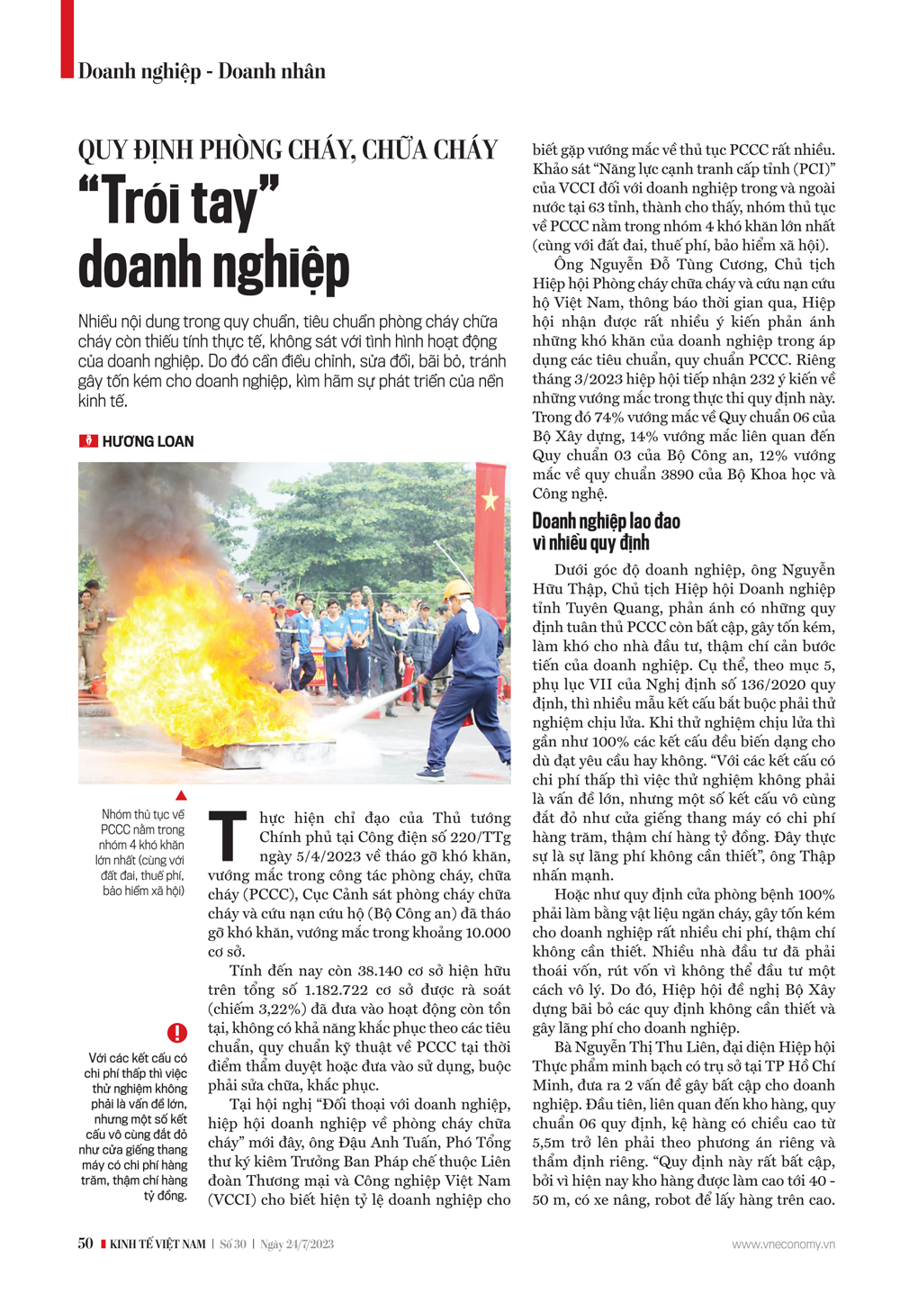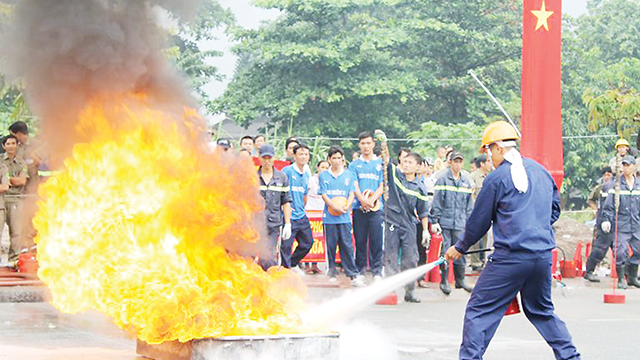[ad_1]
According to the Prime Minister’s instruction in the official message No. 220/TTg of April 5, 2023 on eliminating difficulties and obstacles in fire prevention and suppression, the Fire Prevention and Rescue Police Department (Ministry of Public Security) has eliminated difficulties and obstacles in about 10,000 establishments.
Of a total of 1,182,722 existing systems checked, 38,140 (3.22%) that have been commissioned and are still in operation cannot be rehabilitated according to the standards and technical regulations for fire prevention and firefighting applicable at the time of approval or commissioning and must be repaired or rehabilitated.
At the recent conference “Dialogue with Businesses and Business Associations on Fire Prevention and Suppression,” Mr. Dau Anh Tuan, deputy secretary-general and head of the legal department of the Vietnam Trade and Industry Confederation (VCCI), said that a large percentage of businesses have reported problems with fire prevention and suppression procedures.
VCCI’s Provincial Competitiveness (PCI) survey of domestic and foreign companies in 63 provinces and cities shows that the group of fire prevention and suppression procedures is in the top 4 group of difficulties (along with real estate, taxes and social security).
Mr. Nguyen Do Tung Cuong, chairman of the Vietnam Fire Prevention and Rescue Association, said the association has received numerous comments over the past period reflecting the difficulties encountered by companies in applying fire safety and fire safety standards and regulations.
In March 2023 alone, the association received 232 comments on problems with the implementation of this regulation. Of these, 74% have problems with Order 06 of the Ministry of Construction, 14% have problems with Order 03 of the Ministry of Public Security, 12% have problems with Order 3890 of the Ministry of Science and Technology.
COMPANIES SUFFER FROM MANY REGULATIONS
From the companies’ perspective, Mr. Nguyen Huu Thap, chairman of the Tuyen Quang Provincial Business Association, said there are insufficient fire safety regulations, which are costly, cause difficulties for investors and even hamper the progress of companies. In particular, according to Section 5, Annex VII of Decree No. 136/2020, many structural samples must undergo a fire resistance test. In the fire resistance test, almost 100% of structures are deformed, regardless of whether they meet the requirements or not.
“For low-cost structures, testing isn’t a big deal, but some extremely expensive structures like elevator shaft doors cost hundreds or even billions of dongs. It really is unnecessary waste,” Mr. Thap stressed.
Or like the requirement that hospital doors must be made of 100% fireproof materials, which costs companies a lot of money, if not unnecessarily. Many investors have had to sell or withdraw capital because they could not invest improperly. Therefore, the association proposed to the Ministry of Construction to get rid of unnecessary regulations and create waste for businesses.
Ms Nguyen Thi Thu Lien, representative of the Ho Chi Minh City-based Transparency Food Association, raised two issues that create inefficiencies for businesses. Firstly, Regulation 06 regarding warehouses requires that racks 5.5m high or more must be constructed according to a separate plan and assessed separately.
“This regulation is very inadequate as warehouses are currently being built up to a height of 40 to 50 m and forklifts and robots pick up the goods from above. In these warehouses, the number of waiters is very small. Therefore, the rule that warehouses over 5.5 m in height must have their own plans and separate reports is not practicable,” said Ms. Lien.
Due to the socio-economic development situation, it is completely normal for companies to change their production functions and switch from one type to another. For example, some member companies previously active in the textile, export and wood processing sectors have drawn up and approved fire prevention and suppression plans.
“Currently, wood cannot be exported, textiles have no orders, these companies are switching to exporting fresh fruit and canned fruit – non-combustible goods.” However, the local fire brigade called for a reassessment. It is rigid and insufficient,” said Ms. Lien.
Mr Nguyen Hong Hai, Member of the Executive Committee of the Vietnam Association of Agents, Brokers and Maritime Services, gave his opinion on the lists of fire protection and firefighting equipment that seaports are required to invest in, such as: B. Fire trucks, firefighting ships, special resources deployed … estimated cost of up to hundreds of billions of dongs for each seaport. This does not include operating, maintenance and repair costs. This will increase logistics costs and thereby reduce the competitiveness of Vietnamese logistics companies. Therefore, Mr. Hai proposed to abolish the regulations on the separate equipment of firefighting vehicles and ships in each seaport company.
DOMESTIC BUSINESSES MUST BE POSITIVE
Ahead of the company’s recommendations, Mr. Cuong openly said that what the company is talking about is only “the tip”. In order to solve the problem as a whole, government agencies need to issue amendments to the relevant regulations and amendments to the Fire Prevention and Suppression Law.
It is known that the Ministry of Public Security is currently working with the Ministry of Justice on a project to amend Decree 136 and the changes are expected to be published by August at the latest. In addition, the government’s Ministry of Public Security has proactively proposed an amendment to the Fire Prevention and Suppression Law to simplify and maximize administrative procedures and minimize the basic investment costs for businesses. In addition, the decentralization and maximum decentralization of armed forces and units in the provinces and cities should be strengthened in order to eliminate all the problems related to fire prevention and suppression as a whole.
According to Mr. Cuong, many regulations and standards currently lack practicality and are not close to companies’ production and business activities. This is not only the case with relevant standards in Vietnam, but also with advanced countries around the world. Their legal regulations in the construction process also encountered similar situations.
However, the difference in Vietnam is that corporate participation is still very passive. Mr. Cuong shared that as part of the association process, the Ministry of Construction, in cooperation with the Ministry of Public Security, sent amendments to 50 Vietnamese industrial associations and 39 representative associations of foreign enterprises (FDI) in Vietnam, and received replies from most representatives of foreign direct investment enterprises. They worked with government agencies to comment on the content of the draft.
Especially when it comes to domestic companies, only 1/50 of the 400 largest companies in Vietnam received feedback. “Vietnamese companies shouldn’t just wait until the issue is too complicated to voice their opinions, they must actively participate in the drafting process,” Mr. Cuong said.
The content of the article was published in Vietnam Economic Journal No. 30 – 2023, published on July 24, 2023. Readers are welcome to read it here:
https://postenp.phaha.vn/chi-tiet-toa-soan/tap-chi-king-te-viet-nam

[ad_2]
Source link

